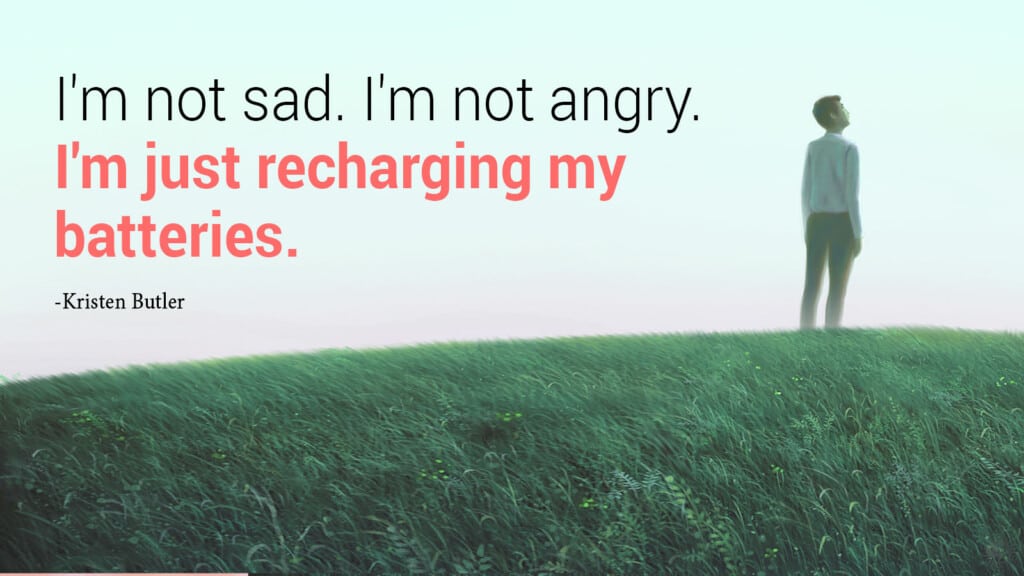Here’s why an HSP tires so quickly.
Highly sensitive people (HSPs) are individuals with heightened sensitivity. They have a more sensitive nervous system, which can lead to exhaustion. HSPs become fatigued quickly due to their heightened sensitivity.
Dr. Elaine Aron first identified and researched this personality type in 1991. She found that some people have unique traits that distinguish them from others. They are more perceptive to subtle environmental stimuli, such as bright lights, loud noises, or strong smells.
That heightened sensitivity can be a blessing and a curse. On one hand, it allows them to appreciate beauty and art profoundly. On the other hand, it can also make them more susceptible to feeling overwhelmed or overstimulated.
For example, a highly sensitive person may find themselves deeply moved by a piece of music or art, experiencing various emotions and physical sensations. While this ability to connect with beauty profoundly can be enriching, it can also leave them feeling emotionally drained and needing solitude to recover their energy.
The Link Between Sensitivity and Fatigue

HSPs may struggle with overgiving, people-pleasing, and saying yes when they want to say no, contributing to fatigue. The presence of “energy vampires” in their lives can drain the energy of HSPs, leading to fatigue.
One of the reasons highly sensitive people are prone to fatigue is that they often put the needs of others before their own.
They strongly desire to please and help others, which can lead to overextending themselves. This constant giving without taking the time to recharge can result in exhaustion.
In addition, highly sensitive people are more susceptible to the influence of others’ emotions and energy. They absorb the emotions of those around them like a sponge, which can be emotionally and energetically draining. Being surrounded by negative or demanding people can deplete their energy reserves and contribute to fatigue.
For instance, a highly sensitive person who frequently volunteers to help others may be constantly exhausted. They may struggle to say no to additional commitments, even when they know they need to take care of themselves. This pattern of overgiving and people-pleasing can cause chronic fatigue and a lack of energy to meet their own needs.
The Point System of Mental Energy
Mental energy is like a point system, where various activities deduct points from HSPs’ energy reserves. When energy points are chronically low, HSPs experience increased sensitivity, emotional reactions, stress, anxiety, and resentment.
Imagine that each activity throughout the day requires several mental energy points. Simple tasks like getting ready in the morning or doing household chores may only deduct a few points. However, more demanding activities like attending a social gathering or making vital decisions may deduct significant points. These deductions can add up quickly for highly sensitive people and leave them mentally and physically drained.
For example, a highly sensitive person who attends a crowded and noisy party may find the experience overwhelming and exhausting. The constant stimulation and social interaction can deplete their mental energy points, leaving them feeling emotionally drained and needing solitude to recharge.
Breaking the Cycle of Exhaustion
HSPs can prioritize their energy and prevent exhaustion by being intentional with energy, taking mindful breaks, and practicing self-compassion. Prioritizing sleep is crucial for preventing fatigue in HSPs. Seeking guidance and support, such as through an online program, can benefit HSPs in managing their experiences and finding empowerment.
To break the cycle of exhaustion, the HSP needs to learn to be intentional with their energy. That means recognizing their limits and saying no when necessary, even if it means disappointing others.
It also involves taking regular daily breaks to recharge. That can also mean taking time to partake in joyful and relaxed activities. By practicing self-compassion and prioritizing their well-being, highly sensitive people can prevent fatigue and maintain a healthy balance.
For instance, a highly sensitive person may schedule regular breaks throughout their workday to rest and recharge. During these breaks, they may engage in activities that help them relax and rejuvenate, such as walking in nature, practicing deep breathing exercises, or listening to calming music. By incorporating these mindful breaks into their routine, they can prevent exhaustion and maintain their mental and physical well-being.
Chronic Fatigue in Highly Sensitive People
HSPs tend to do more mental work than others, which can lead to chronic fatigue syndrome (CFS). Adapting to a fast-paced and achievement-focused society takes a toll on the bodies of HSPs, contributing to chronic fatigue. Recovery from chronic fatigue as an HSP requires listening to and caring for one’s physical, mental, and emotional needs.
Highly sensitive people often find themselves mentally and emotionally fatigued due to the demands of their daily lives. Their heightened sensitivity and deep information processing require more mental energy than the average person. This constant mental work can lead to chronic fatigue syndrome. That presents as persistent and unexplained fatigue not relieved by rest.
For example, an HSP who experiences chronic fatigue may work with a therapist to explore the underlying causes of their exhaustion. They may uncover patterns of overexertion, perfectionism, or unresolved emotional issues contributing to fatigue. By addressing these underlying factors and making necessary changes in their lifestyle and mindset, they can begin to recover from chronic fatigue and regain their energy levels.
Other Health Issues in Highly Sensitive People (Besides Fatigue)
Highly sensitive people are more reactive to stress, which can lead to potential health issues. Chronic stress can up-regulate the immune system and lead to chronic inflammation and memory problems. Spending time in nature, regular exercise, and bonding with loved ones or pets benefit highly sensitive people’s health.
The heightened sensitivity of highly sensitive people affects their mental and emotional well-being. It also has implications for their physical health. Highly sensitive people may be more reactive to stress, both psychologically and physiologically. When exposed to stressors, their bodies release more stress hormones, leading to chronic inflammation and other health issues.
For instance, an HSP dealing with chronic stress and its associated health issues may prioritize spending time in nature as a form of self-care. They may integrate regular walks in the park or hikes in nature into their routine to reduce stress and promote relaxation. Immersing themselves in nature’s calming and rejuvenating environment can support their physical and mental well-being.
Decision-Making Challenges for Highly Sensitive People
Highly sensitive people have brains that are wired differently, affecting how they process information and make decisions. Decision fatigue is more intense for highly sensitive people, especially during the COVID-19 pandemic. Taking time, knowing needs and values, and talking it out with someone trusted can help highly sensitive people make decisions.
Making decisions can be challenging for highly sensitive people due to their unique way of processing information. Their brains are wired differently, making them more attuned to subtleties and nuances in their environment. While this heightened sensitivity can be an asset in many situations, it can also lead to decision fatigue.
For instance, a highly sensitive person may struggle to make decisions in a fast-paced and unpredictable environment. They may struggle with choosing between multiple options as they carefully consider each choice’s potential outcomes and implications. This indecisiveness can be mentally exhausting and contribute to decision fatigue.
To alleviate decision fatigue, highly sensitive people can implement strategies that help simplify decision-making. Taking time to pause and reflect before deciding can allow them to regain mental clarity and prevent impulsive choices.
It is also essential for highly sensitive people to understand their own needs, values, and priorities, as this self-awareness can guide them in making decisions that align with their well-being. Finally, talking it out with someone they trust, such as a friend or therapist, can provide valuable perspective and support in the decision-making process.
Coping Strategies for Highly Sensitive People to Reduce Fatigue
The HSP can cope with fatigue by practicing self-care and creating a supportive environment. Setting boundaries is essential for protecting energy and preventing fatigue in highly sensitive people.
Mindfulness and stress reduction techniques can manage fatigue in highly sensitive people. Engaging in creative outlets and activities that bring joy and fulfillment benefits highly sensitive people. Building a support network and connecting with others can provide valuable support.
Highly sensitive people need coping strategies to cope with fatigue and maintain their well-being. Self-care is crucial. That’s because it allows them to replenish their energy reserves and prevent exhaustion. This may involve taking baths or practicing relaxation techniques – think meditation or deep breathing. It can also mean engaging in hobbies that bring them joy.
Setting boundaries is another essential coping strategy for highly sensitive people. They need to establish clear limits and communicate their needs. That may involve saying no to excessive demands or taking breaks. By protecting their energy and honoring their needs, highly sensitive people can prevent fatigue and maintain a healthy balance.
Mindfulness and stress reduction techniques can also help to manage fatigue for highly sensitive people. Practicing mindfulness can cultivate a greater awareness of their thoughts, emotions, and physical sensations. This awareness allows them to recognize and address signs of fatigue before it escalates. Stress reduction techniques, including deep breathing exercises or progressive muscle relaxation, can help calm their nervous system and promote relaxation.
For example, a highly sensitive person dealing with fatigue may incorporate creative outlets into their daily routine to recharge and find fulfillment. They may engage in painting, writing, or playing a musical instrument. By immersing themselves in these creative pursuits, they tap into their inner joy and replenish their energy levels.
Building a support network is also vital for highly sensitive people. Connecting with others with similar traits and experiences can offer validation and understanding. These can include online communities, support groups, or activities that allow them to meet like-minded individuals. By building a support network, highly sensitive people can receive valuable support from others who can relate to their experiences.

Final Thoughts on Highly Sensitive People and Fatigue
Highly sensitive people become fatigued quickly. The HSP can manage and prevent fatigue by understanding their needs, setting boundaries, practicing self-care, and implementing coping strategies. By prioritizing their energy, taking mindful breaks, and participating in activities that spark joy and fulfillment, highly sensitive people can maintain their well-being and thrive in a world that may be overwhelming at times.





















